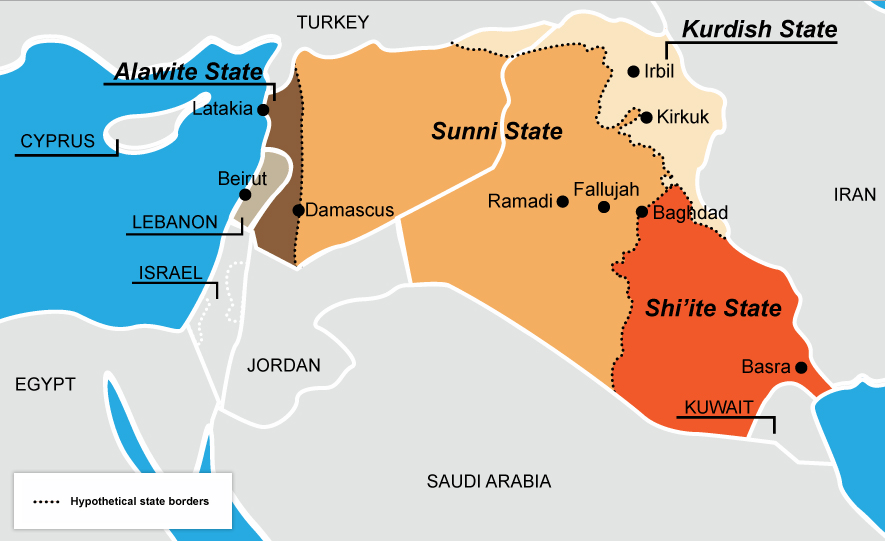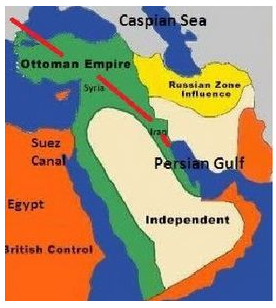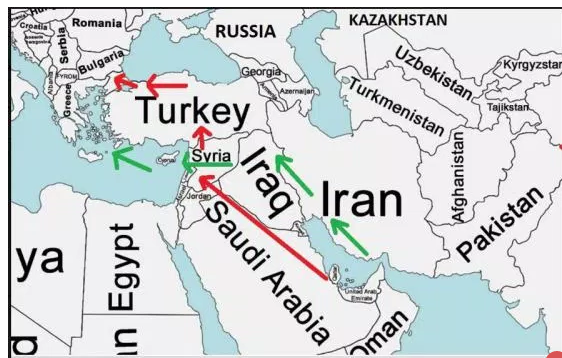The Creation of Syria and Iraq
A very nice map of Syria and Iraq, which shows with dark brown the Muslim Alawite part at the Syrian coasts, with brown the Sunni Muslim parts of Syria and Iraq, with orange the Shiite Muslim part of Iraq, and with pink the Kurdish (Sunni) Muslim part of Syria and Iraq.
Map 1 Iraq and Syria

http://cdn2.vox-cdn.com/assets/4396135/sunni-shia-kurd_state_crop.jpg
Syria and Iraq did not exist as states until the First World War 1914-1918. These pieces of land were parts of various empires until then, with the Ottoman Empire being the last one. During the First World War (1914-1918), the English and the French helped the local Arab populations to revolt against the Ottomans, because they wanted to prevent the Germans from reaching the Persian Gulf through the Austro-Hungarian Empire and the Ottoman Empire which were German allies.
Map 2 German, Austro-Hungarian and Ottoman Empires


When the English, the French and the Arabs did actually win the war and the Ottomans left the Middle East, it was time to decide how the new lands would be distributed to the Arab allies of the English and the French. The English and the French agreed that what became Iraq and Palestine (Jordan+Israel) would be under English influence, and what became Syria and Lebanon would be under French influence.
For the English the Iraqi oil was very important because the oil of Saudi Arabia was not discovered until 1938. The English could also export this oil through Palestine (Jordan+Israel) to the Mediterranean Sea. Moreover the corridor formed by Israel+Jordan+Iraq would offer the English an alternative route to India, which was their most important colony.
When the pro-Soviet socialist dictators rose to power in Syria and Iraq, they used a socialist model and diminished the role of religion in order to homogenize their populations. They also used Arab nationalism to achieve this same goal, since most of their citizens were Arabs, with the exception of the Kurds of course. What is strange is that in both Syria and Iraq the socialist dictators who managed to rise to power belonged to the minorities of these countries. In Syria the father of Bashar al Assad, Hafez Assad, was an Alawite, while Sunni Muslims were the majority of the Syrian population. In Iraq Sadam Hussein was a Sunni Muslim, while Shiite Muslims were the majority of the Iraqi population. Allawites are an offshoot of Shiite Islam.
In 2009 Bashar al Assad refused to allow the Qatar-Turkey pipeline to pass through Syria i.e. the Sunni Pipeline, while he agreed to let the Iran-Iraq-Syria pipeline to pass through Syira i.e. the Shiite Pipeline. The Iran-Syria pipeline would be constructed by Gazprom. As a result the Turks and the Arabs of the Persian Gulf supported the Sunni Muslims of Syria and Iraq, who revolted against the Alawites in Syria and against the Shiites in Iraq. That’s the reason ISIS is the first terrorist organization which wants to establish its own state i.e. the Sunni parts of Syria and Iraq. If that does indeed happen, an Alawite state will have to be created at the Mediterranean coasts of Syria, a Shiite state in Iraq, and a Kurdish state in Iraq and Syria.
Map 3 Sunni (red) VS Shiite (green) Pipelines








